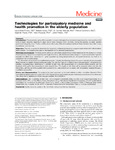Technologies for participatory medicine and health promotion in the elderly population

View/
Use this link to cite
http://hdl.handle.net/2183/21603
Except where otherwise noted, this item's license is described as Creative Commons Attribution 4.0 International License (CC-BY 4.0)
Collections
- Investigación (FIC) [1685]
Metadata
Show full item recordTitle
Technologies for participatory medicine and health promotion in the elderly populationAuthor(s)
Date
2018-05-18Citation
Nieto-Riveiro L, Groba B, Miranda MC, Concheiro P, Pazos A, Pousada T, Pereira J. Technologies for participatory medicine and health promotion in the elderly population. Medicine (Baltimore). 2018 May;97(20):e10791.
Abstract
[Abstract] Introduction: The progressive aging of the population is a socio-demographic phenomenon experienced by most countries in the world in recent decades, especially in Japan and in many European Union countries. During this process, so-called “geriatric syndromes” frequently occur. The focus of this study is the quality of life of the elderly in relation to these 3 factors: risk of falls, urinary incontinence, and insomnia.
Objective: The main purpose is to determine the impact of a multifactorial intervention program implemented with institutionalized elderly people. The program is focused on the treatment of the aforementioned factors.
Methods and Analysis: The study will be carried out with elderly people living in three residences for the elderly in A Coruña Province (Galicia, Spain).It is a prospective and longitudinal study, with a temporary series design of a “quasi-experimental” type that evaluates the effect of an intervention in 1 given population by doing assessments pre- and post-intervention, but there is no comparison with a control group.
The intervention will be based on a multifactorial program, including the following phases: the use of wearable devices (wearable fitness trackers to register physical activity and sleep), the use of an App on a Tablet to record the participants’ occupations and activities, counseling about performance in activities of daily living, the implementation of a physical activity program, and the treatment of the pelvic floor (according to each research line). The Quality of Life (QoL) will be assessed before and after the intervention, with the use of the questionnaire EuroQol-5D-5L. Data analysis will be applied with all registered variables through a quantitative perspective.
Ethics and Dissemination: The protocol has been approved by the host institution's ethics committee (Research Ethics Committee of Galicia) under the number 2017/106. Results will be disseminated via peer-reviewed journal articles and conferences. This clinical trial is registered at ClinicalTrials.gov identifier: NCT03504813.
Keywords
Elderly
Insomnia
Quality of life
Risk of fails
Urinary incontinence
Wearables
Insomnia
Quality of life
Risk of fails
Urinary incontinence
Wearables
Description
Study protocol clinical trial
Editor version
Rights
Creative Commons Attribution 4.0 International License (CC-BY 4.0)
ISSN
0025-7974






